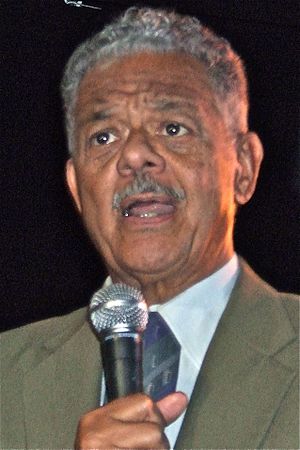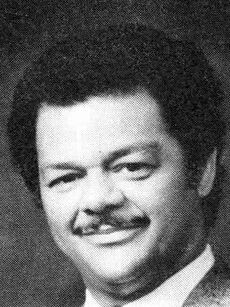Robert C. Farrell facts for kids
Quick facts for kids
Robert C. Farrell
|
|
|---|---|

Farrell in 2012
|
|
| Member of the Los Angeles City Council from the 8th District | |
| In office June 28, 1974 – June 30, 1991 |
|
| Preceded by | Billy G. Mills |
| Succeeded by | Mark Ridley-Thomas |
| Personal details | |
| Born | October 1, 1936 Natchez, Mississippi |
| Political party | Democratic |
| Residence | Los Angeles, California |
Robert C. Farrell (born October 1, 1936) is a politician who served on the Los Angeles City Council for many years. He was a council member from 1974 until 1991. Before becoming a politician, he worked as a journalist and also published his own newspaper.
Robert Farrell's Early Life and Career
Growing Up and Education
Robert C. Farrell was born in Natchez, Mississippi, on October 1, 1936. His family moved to different cities, including New Orleans and Newark, New Jersey. Eventually, they settled in Los Angeles, California. He attended Los Angeles High School and graduated in 1954.
After high school, he joined the Navy. In 1956, he was promoted to midshipman. The Navy also gave him a scholarship to attend UCLA. He earned a Bachelor of Arts degree in Near Eastern Studies in 1961. He returned to UCLA in 1962 to study journalism.
Working as a Journalist
Farrell began his career as a reporter for newspapers that focused on the black community. He wrote for the California Eagle and the Los Angeles Sentinel. He also worked as a correspondent for Jet magazine.
In 1966, he started his own newspaper in Watts, called the Star-Review. He also helped with a report for UCLA. This report looked into problems with unemployment in South Los Angeles.
Family Life
Robert Farrell has been married. He has two daughters, Mia Ann Farrell and Kongit Arlicekathinia Farrell. He is currently married to Windy Barnes-Farrell.
Robert Farrell's Political Career
Starting in Politics
Farrell first became involved in politics during the Johnson-Humphrey Presidential campaign of 1964. In 1970, he helped with John Tunney's U.S. Senate campaign. He worked as a coordinator for black communities across the state.
In 1971, he joined the national team for George McGovern. McGovern was trying to become the Democratic presidential candidate. Farrell then worked on Tom Bradley's campaigns for mayor of Los Angeles.
Serving on the City Council
Becoming a Council Member
Robert Farrell worked as an assistant to Billy G. Mills. Mills was the City Councilman for the 8th District. When Mills became a judge in 1974, Farrell was elected to take his place.
The 8th District was in South-Central Los Angeles. It stretched from Adams and Jefferson Blvds. in the north to 118th St. in the south. This area faced serious challenges like crime, unemployment, and housing issues.
Facing Recall Elections
Farrell served on the City Council for 17 years. During his time, he faced a recall election in 1978. A recall election is when citizens vote to remove an elected official from office before their term ends. People who wanted to recall him criticized him for "dirty streets and alleys." They also mentioned a comment he made that they felt showed disrespect for senior citizens.
Farrell won the 1978 recall vote by a clear margin. Another attempt to recall him happened in 1988. However, it failed because not enough signatures were collected to put it on the ballot.
Key Positions and Beliefs
Supporting Government Action
Farrell was known for being a "liberal" politician. This means he believed that the government should play an active role in solving problems. He thought the government should step in to help people and communities. This view was different from some other council members who relied more on private businesses to solve problems.
Fighting Apartheid in South Africa
In the 1980s, Farrell strongly criticized Apartheid in South Africa. Apartheid was a system of racial segregation and discrimination. He used his position to support those who fought for freedom, like Nelson Mandela.
Farrell also worked to make Los Angeles stop doing business with South Africa. He pushed for the city to avoid contracts with companies that worked in Apartheid South Africa. When this policy passed, he said it made the city proud. Archbishop Desmond Tutu thanked him for his efforts. In 1986, Farrell traveled to Africa with Rev. Jesse Jackson to encourage an end to Apartheid.
Other Important Issues
- Fluoridation: In 1974, Farrell was among the council members who voted to add fluoride to the city's water supply. This helps prevent tooth decay.
- Housing: He believed it was important to improve existing homes rather than just building new ones. He said, "What we can count on is what we can see and what we can touch."
- Middle East: In 1984, Farrell visited Israel. He warned that expelling a group of African-American immigrants, known as the Black Hebrews, would upset black communities in America. He said it would also harm Israel's standing in American public opinion. In 1988, he visited Saudi Arabia with other U.S. mayors.
- Development: Farrell supported building a shopping center in North University Park. This was despite some residents worrying it would destroy historic homes. He voted for the project in 1987.
Questions Raised About His Actions
In December 1987, a newspaper published stories that raised questions about some of Farrell's decisions. These stories suggested he had arranged for a social service agency, run by his wife, to receive benefits.
The newspaper reported that Farrell had convinced a bank to donate property to this agency. Later, the city leased the same property from the agency for a field office. The city paid rent for this property. The investigation also found that the agency sold a part of the property but continued to receive rent from the city for it. The agency later repaid the city for this rent.
Other public funds also went to the agency. Farrell was the head of the council's grants committee at the time. He also put some of his family members on the City Hall payroll. Farrell stated that there was "no scheme" and that his actions were not improper.
During this time, some of Farrell's own constituents tried to recall him. The Los Angeles County District Attorney's office began to review Farrell's conduct. This review later became a full investigation. In February 1991, the District Attorney's office dropped its investigation. They stated that they determine if laws were broken, and it is up to others to make moral judgments.
State Assembly Race
In 1990, Robert Farrell ran for a seat in the California State Assembly. He lost the election to Marguerite Archie-Hudson. The seat he sought had previously been held by Maxine Waters.
 | Aurelia Browder |
 | Nannie Helen Burroughs |
 | Michelle Alexander |


